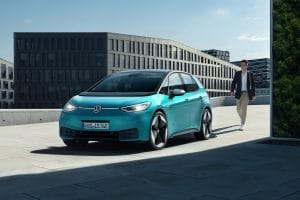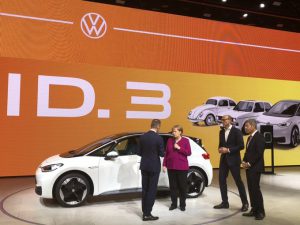
Frank Blome, VW’s head of the Battery Cell Business Unit says Volkswagen guarantees a minimum battery capacity of 70% over eight years or 160,000 kilometers.
Automakers around the world are rapidly increasing the number of electric vehicles they plan to bring to market, and perhaps none more aggressively than Volkswagen. However, this shift comes with a complication: battery supplies
Most automakers use batteries with cobalt in them, which is getting harder and harder to mine and costing more and more to do so. Volkswagen is looking to resolve some of those issues by changing the batteries it plans to use.
VW will raise the amount of nickel used in its electric car battery cells to 80% in the next year from 65% at present, Frank Blome, head of battery cells at the carmaker said on Tuesday.
(Volkswagen shutting European factories for two weeks, warns of “very difficult year.”)

Volkswagen’s move to EVs begins in Europe with the new ID.3 BEVs this year, despite the shutdown in Europe.
Volkswagen’s current electric car battery cell contains 65% nickel, 15% cobalt and 20% manganese. The next generation will cut the cobalt and manganese, resulting in a battery made up of 80% nickel, 10% cobalt and 10% manganese, Blome told analyst, according to Reuters.
Volkswagen isn’t the only automaker looking to reduce its reliance on cobalt for its EV batteries. Tesla has been looking to cut its reliance on cobalt-based batteries. CEO Elon Musk said in mid-2018 the company’s cells used just 3% cobalt and the next-generation would free of the very pricey material. Cobalt costs $33,500 a metric ton and the supply chain is complicated.
Tesla reportedly is in the final stages of discussions with CATL to become its source for its China-produced Model 3 sedans using lithium-iron-phosphate, or LFP, batteries.
(Volkswagen’s new software aims to eliminate crashes by 2050.)
The automaker is pushing to meet its stated goal of building 3 million electric cars by 2025 with 300 gigawatts hours of battery cells. Those vehicles will be primarily sold in Europe and Asia, he noted.

German Chancellor Angela Merkel told automakers they faced a “Herculean task” trying to mitigate climate change.
By pushing the production levels higher, VW is hoping to get some cost reductions, ultimately getting the battery packs below $100 per kilowatt hour by 2025. “Volkswagen guarantees a minimum battery capacity of 70% over eight years or 160,000 kilometers,” he said.
The company is also looking to make additional improvements in battery technology, especially in terms of cost, range and charging times. “I expect that we will be able to significantly reduce charging times and increase energy content from around 2024 onwards by using silicon anodes,” Blome said.
(It’s Official: ID Crozz Concept will reach U.S. market as the ID.4.)
“We will probably achieve the next big leap with the solid-state battery. Together with our partner QuantumScape, we are working intensively to bring them to market maturity.”
